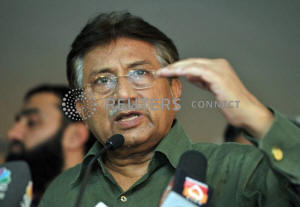Pakistan court sentences former military ruler Musharraf to death for
treason
 Send a link to a friend
Send a link to a friend
 [December 17, 2019]
By Asif Shahzad [December 17, 2019]
By Asif Shahzad
ISLAMABAD (Reuters) - A Pakistani court
sentenced on Tuesday former military ruler Pervez Musharraf to death on
charges of high treason and subverting the constitution, government
officials said.
Musharraf, who seized power in a 1999 coup and later ruled as president,
is not in Pakistan and was not available for comment on the sentence,
handed down by an anti-terrorism court hearing the high treason case.
"Pervez Musharraf has been found guilty of Article 6 for violation of
the constitution of Pakistan," government law officer Salman Nadeem
said.
The court's full ruling was not available but it said in a summary it
had analyzed complaints, records, arguments and facts in the case and
had reached a majority verdict, with two of the three judges giving the
decision against Musharraf.

The charges stem from Musharraf's imposition of a state of emergency in
2007, when he was facing growing opposition to his rule.
Under the emergency, all civil liberties, human rights and democratic
processes were suspended, from November 2007 to February 2008.
He resigned later in 2008, after a political party that backed him fared
poorly in a general election, and he has spent much of the time since
then abroad.
[to top of second column]
|

Pakistan's former President Pervez Musharraf speaks during a news
conference in Dubai March 23, 2013. REUTERS/Mohammad Abu Omar

The final years of his rule was marked by struggles with the
judiciary stemming from his wish to remain head of the army while
also being president.
Last month, Musharraf issued a video recording from a hospital bed
in Dubai in which he said he was not being given a fair hearing in
the case that was filed by the government in 2013.
"I served the nation and made decisions for the betterment of the
country," Musharraf said in the video clip.
Legal experts in Islamabad said Musharraf can challenge the order in
the High Court.
Musharraf sided with the United States in its "war on terror"
launched after the Sept. 11, 2001, attacks on U.S. cities.
His decision was criticized by religious parties and ushered in
years of Islamist violence in Pakistan.
(Reporting by Asif Shahzad in Islamabad, Writing by Rupam Jain;
Editing by Robert Birsel)
[© 2019 Thomson Reuters. All rights
reserved.]
Copyright 2019 Reuters. All rights reserved. This material may not be published,
broadcast, rewritten or redistributed.
Thompson Reuters is solely responsible for this content. |